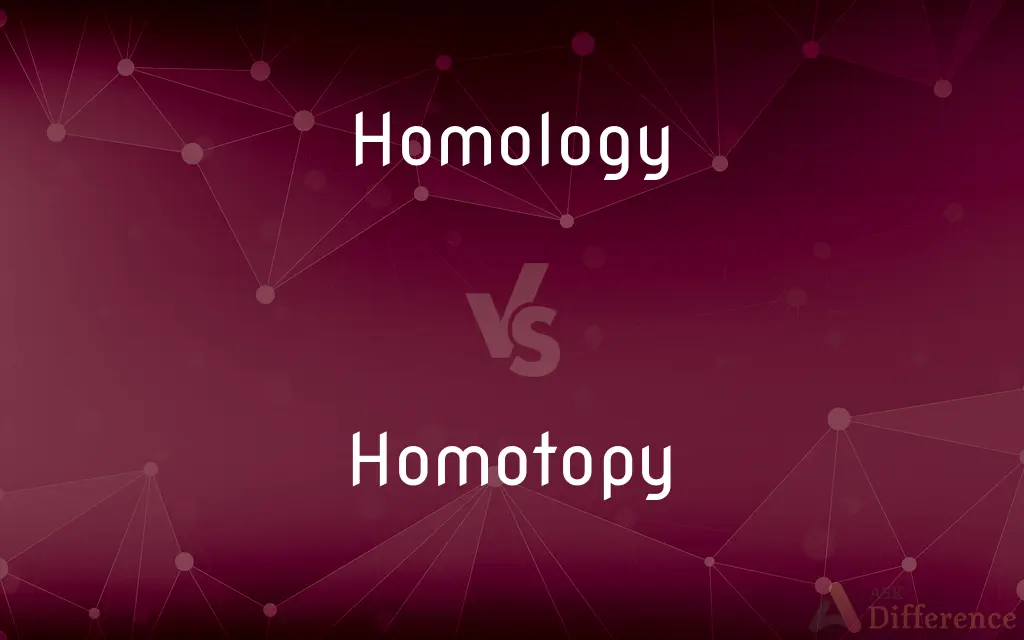Homology vs. Homotopy — What's the Difference?

Difference Between Homology and Homotopy
ADVERTISEMENT
Compare with Definitions
Homology
The quality or condition of being homologous.
Homotopy
In topology, a branch of mathematics, two continuous functions from one topological space to another are called homotopic (from Ancient Greek: ὁμός homós "same, similar" and τόπος tópos "place") if one can be "continuously deformed" into the other, such a deformation being called a homotopy (, hə-MO-tə-pee; , HOH-moh-toh-pee) between the two functions. A notable use of homotopy is the definition of homotopy groups and cohomotopy groups, important invariants in algebraic topology.In practice, there are technical difficulties in using homotopies with certain spaces.
Homology
A homologous relationship or correspondence.
Homotopy
(topology) A continuous deformation of one continuous function or map to another.
The concept of homotopy represents a formalisation of the intuitive idea of a smooth deformation of one curve into another.
Homology
The relation of the elements of a periodic family or group.
ADVERTISEMENT
Homotopy
(uncountable) The relationship between two continuous functions where homotopy from one to the other is evident.
Homology
The relation of the organic compounds forming a homologous series.
Homotopy
(informal) homotopy theory {{gloss}}.
Homology
(Mathematics) A topological classification of configurations into distinct types that imposes an algebraic structure or hierarchy on families of geometric figures.
Homotopy
(topology) A theory associating a system of groups with each topological space.
Homology
The relationship of being homologous; a homologous relationship;
specifically, such relationship in the context of the geometry of perspective.
specifically, such relationship in the context of the geometry of perspective.
Homotopy
(topology) A system of groups associated with a topological space.
Homology
An automorphism of the projective plane (representing a perspective projection) that leaves all the points of some straight line (the homology axis) fixed and maps all the lines through some single point (the homology centre) onto themselves.
If the homology centre lies on the homology axis, the homology is said to be singular or parabolic; otherwise, it is called non-singular or hyperbolic.
Homology
A general way of associating a sequence of algebraic objects, such as abelian groups or modules, to a sequence of topological spaces; also used attributively: see Usage notes below.
Homology
(algebra) Given a chain complex {Gn} and its associated set of homomorphisms {Hn}, the rule which explains how each Hn maps Gn into the kernel of Gn+1.
Because of their connection with both homology and cohomology, chain complexes are an important topic of study in homological algebra.
Homology
(chemistry) The relationship, between elements, of being in the same group of the periodic table.
Homology
(organic chemistry) The relationship, between organic compounds, of being in the same homologous series.
Homology
The relationship, between characteristics or behaviours, of having a shared evolutionary or developmental origin;
(evolutionary theory) specifically, a correspondence between structures in separate life forms having a common evolutionary origin, such as that between flippers and hands.
(evolutionary theory) specifically, a correspondence between structures in separate life forms having a common evolutionary origin, such as that between flippers and hands.
Homology
(genetics) The presence of the same series of bases in different but related genes.
Homology
(anthropology) The relationship, between temporally separated human beliefs, practices or artefacts, of possessing shared characteristics attributed to genetic or historical links to a common ancestor.
Homology
The quality of being homologous; correspondence; relation; as, the homologyof similar polygons.
Homology
Correspondence or relation in type of structure in contradistinction to similarity of function; as, the relation in structure between the leg and arm of a man; or that between the arm of a man, the fore leg of a horse, the wing of a bird, and the fin of a fish, all these organs being modifications of one type of structure.
Homology
The correspondence or resemblance of substances belonging to the same type or series; a similarity of composition varying by a small, regular difference, and usually attended by a regular variation in physical properties; as, there is an homology between methane, CH4, ethane, C2H6, propane, C3H8, etc., all members of the paraffin series. In an extended sense, the term is applied to the relation between chemical elements of the same group; as, chlorine, bromine, and iodine are said to be in homology with each other. Cf. Heterology.
Homology
The quality of being similar or corresponding in position or value or structure or function
Share Your Discovery

Previous Comparison
Arrangement vs. Schedule
Next Comparison
Consultant vs. Surgeon













































